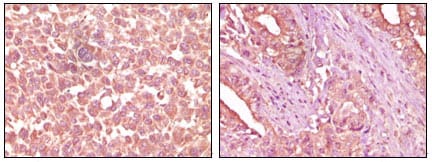

| WB | 1/500 - 1/2000 | Human,Mouse,Rat |
| IF | 咨询技术 | Human,Mouse,Rat |
| IHC | 1/200 - 1/1000 | Human,Mouse,Rat |
| ICC | 技术咨询 | Human,Mouse,Rat |
| FCM | 咨询技术 | Human,Mouse,Rat |
| Elisa | 1/10000 | Human,Mouse,Rat |
| Aliases | ECK; EPHA2 |
| Entrez GeneID | 1969 |
| clone | 1B3C7 |
| Host/Isotype | Mouse IgM |
| Antibody Type | Primary antibody |
| Storage | Store at 4°C short term. Aliquot and store at -20°C long term. Avoid freeze/thaw cycles. |
| Species Reactivity | Human |
| Immunogen | Purified recombinant fragment of EphA2 expressed in E. Coli. |
| Formulation | Ascitic fluid containing 0.03% sodium azide. |
+ +
以下是关于EphA2抗体的3篇参考文献的简要列举:
1. **文献名称**: *"Targeting EphA2 in cancer"*
**作者**: Wykosky J, Debinski W.
**摘要**: 该综述总结了EphA2受体在多种癌症中的过表达及其促肿瘤作用,探讨了EphA2抗体通过阻断配体结合或诱导受体降解来抑制肿瘤生长和转移的机制,并讨论了抗体药物偶联物(ADC)的潜在应用。
2. **文献名称**: *"EphA2 monoclonal antibodies modulate angiogenesis and prevent tumor growth"*
**作者**: Dellinger MT, Brekken RA.
**摘要**: 研究报道了一种人源化EphA2抗体(1C1),通过抑制受体自磷酸化和下游信号通路,减少肿瘤血管生成并增强化疗效果,临床前模型显示其在乳腺癌和肺癌中显著抑制肿瘤进展。
3. **文献名称**: *"Antibody targeting of EphA2 enhances antitumor immune response in pancreatic cancer"*
**作者**: Annese T, Tamma R, et al.
**摘要**: 该研究发现,EphA2抗体通过阻断肿瘤细胞与免疫抑制性微环境的相互作用,促进T细胞浸润并增强抗肿瘤免疫反应,在胰腺癌模型中观察到肿瘤消退和生存期延长。
如需具体文献来源(期刊、年份等),可进一步补充说明。
EphA2 antibodies target the Ephrin receptor A2 (EphA2), a member of the Eph receptor tyrosine kinase family. EphA2 plays dual roles in cellular processes: it regulates normal physiological functions like cell adhesion, migration, and tissue development through ligand-dependent signaling, while its overexpression or dysregulation is linked to pathological conditions, particularly cancer. In tumors, EphA2 often exhibits ligand-independent signaling, promoting malignant behaviors such as proliferation, metastasis, and angiogenesis. Its elevated expression correlates with poor prognosis in cancers like breast, lung, and glioblastoma.
EphA2 antibodies are designed to inhibit these oncogenic pathways. Therapeutic antibodies block ligand-binding domains or EphA2 dimerization, disrupting downstream signaling. Some antibodies induce receptor internalization and degradation, reducing tumor cell survival. Diagnostic antibodies, meanwhile, help detect EphA2 levels in tissues or blood, aiding cancer stratification.
Research also explores EphA2 antibodies in targeted drug delivery, conjugating them to toxins or nanoparticles for precision therapy. Challenges include minimizing off-target effects and overcoming resistance mechanisms. Preclinical studies show promise, with several candidates in early-phase trials. Despite hurdles, EphA2 remains a compelling target due to its cancer-specific dysregulation, offering potential for therapies that spare healthy tissues. Ongoing work aims to optimize antibody specificity and combinatorial approaches with chemo- or immunotherapy.
×